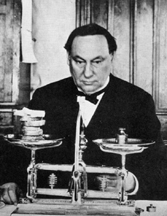
Purdue celebrates 'Father of the FDA,' Indiana's Harvey Wiley, at the state fair

|
"Harvey Wiley is best known for his role in securing the law that established the agency we now call the Food and Drug Administration," said Murray Blackwelder, Purdue's senior vice president for advancement. "He led the way to the landmark legislation of the Food and Drug Act in 1906, but he was a leader long before then. He was the first Purdue chemistry professor and Indiana's first state chemist. He leaves a great legacy to Purdue University, the state of Indiana and the nation."
An invitation-only "all-American picnic" highlighting Wiley's contributions to Purdue and to his field will take place in the hospitality tent at the Indiana State Fair. Representatives from the FDA and Purdue's colleges of Science, Pharmacy, and Consumer and Family Sciences will attend, and Purdue President Martin C. Jischke will speak.
"Harvey Wiley led the way to many of the protections we take for granted today," said Suzanne Junod, a senior historian for the FDA. "The FDA protects against misbranding and adulteration, or what we refer to as 'what you can say and what you can put in' consumer products."
These products include food, drugs, vaccines, cosmetics, medical devices, radiation-emitting devices like televisions and microwaves, and veterinary products.
"Wiley wedded science to regulation and helped establish regulatory agencies to serve the public," said Rodney Noel, interim Indiana State Chemist. "Without such agencies at both the state and federal level, there would be the potential for big problems. There is always the potential for a company that would sell bad products or compromise the safety and quality of a product to save money."
The Office of Indiana State Chemist, based at Purdue, protects the public and the environment, he said. The office is responsible for the safety of seeds, fertilizer, pesticides, pet food, farm animal feed and antibiotics for animals.
"In some ways, what we do today is very similar to what was done in Wiley's time," he said. "We still send people into the field to take samples and analyze the safety and quality of products. Of course, today we have a much larger staff and several labs."
Harvey Washington Wiley was born in Kent, Ind., in 1844. He graduated from Hanover College and taught at Northwestern Christian University, today known as Butler University. He later studied medical science at Harvard University.
In 1874 Wiley was among Purdue's original faculty members and conducted research into food adulteration and the use of sugar substitutes.
"During his nine years here he conducted revolutionary research and caught the eye of government officials," said Dale Margerum, Purdue's Harvey Washington Wiley Distinguished Professor of Chemistry. "He also took on a greater involvement with the students. He was the business manager of the first student newspaper on campus, commander of the first corps of cadets at Purdue, and organized the first baseball and football squads. In fact, he is called the 'Father of Purdue Athletics' in addition to being known as the 'Father of the 1906 Pure Food and Drugs Act.'"
At the time it was considered undignified when Wiley socialized with his students outside of the classroom and joined them in sports. It was considered shocking when he wore knee britches and rode a bicycle, Margerum said.
His high-wheel velocipede was the first bicycle seen in Tippecanoe County, according to his autobiography, and the board of trustees reprimanded him for riding it.
As Indiana State Chemist, Wiley continued to study sugar and the safety of sugar substitutes. This was an important topic at the time due to the high cost to the nation of importing sugar and the need to find a domestic source. He quickly earned a reputation as one of the nation's leading sugar chemists.
Wiley was recruited in 1883 to become head of the Division of Chemistry in the U.S. Department of Agriculture. There, he fought for the first federal law to protect the safety of the food supply and to protect the public from dangerous substances that were often found in common medicinal elixirs and food preservatives.
"There were many dangers to the public at that time," Junod said. "For example, formaldehyde was used as a preservative in milk. Wiley's research showed that no amount of formaldehyde, however small, was a safe amount for consumption."
Wiley continued his pursuit to regulate the safety of food and drugs, and public interest in and support of such laws grew dramatically. In 1906 he led the crusade for the passage of the Pure Food and Drug Act and the Meat Inspection Act.
"These two acts were among the first to give the federal government a role in securing and promoting the health and safety of American consumers," Junod said.
"Harvey Wiley was a larger-than-life character. His ability to build a diverse coalition, including women's groups, journalists, government officials, local and national science associations and groups, and his ability to recognize and tap others' talents to support and implement this law show his passion and intimate knowledge of every aspect of this field."
Visitors to the fair can get a closer look at the university's schools, departments and achievements at more than 50 tents and exhibits.
The Indiana State Fairgrounds is located at 1202 E. 38th St., Indianapolis, and is open from 6 a.m. to 11 p.m.
Writer: Elizabeth Gardner, (765) 494-2081, ekgardner@purdue.edu
Sources: Murray Blackwelder, (765) 496-2144, mblackwelder@purdue.edu
Suzanne White Junod (301) 827-3759, Suzanne.junod@fda.hhs.gov
Rodney Noel, (765) 494-1492, noelr@purdue.edu
Dale Margerum, (765) 494-5268, margerum@purdue.edu
Purdue News Service: (765) 494-2096; purduenews@purdue.edu
Note to Journalists: The all-American picnic will take place Wednesday (Aug. 16) from 5:30-6:30 p.m.
Related news releases:
Purdue to show up in force for annual Purdue Day at the State Fair
University-sponsored day showcases Purdue Agriculture at State Fair
To the News Service home page